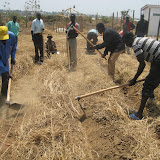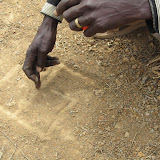Diantha Hodges Mission Letter November/December 2013 South Sudan dianthah@yahoo.com
Dear Friends and Supporters,
There are many challenges to living and working here. I know that this work cannot be done by myself alone. Thank you for the support all have been giving me: the financial support, the prayer support and the personal support, and prayer for Steve's transition to his agricultural risk management work. As Partners in Mission, I want to alert you to a special opportunity through the United Methodist Church. Tuesday, December 3 is a special day of giving, called # Giving Tuesday (after good response last year to Thanksgiving time donations). All on-line gifts given to UMC Advance Special offerings on this day will be matched dollar for dollar. If you are able to help out, there are instructions below. Finances for my programs come from the Advance Special S Sudan HEAL, and My personal support also comes through Advance Special for Volunteers in Mission. Thank you!!
Living here provides many examples of the stark reality of challenges and devastation within human lives: I have not met a person who does not have a story of struggle or tragedy, in the present or recent past. And many of them are not directly war related, but perhaps partly a result of disrupted families and communities. Besides the tragedies of families being broken up by death, multiple marriages that don't work out which leave children and women without support, there is poverty, the challenges of lack of access to education, terrible roads and communication systems, poor health care . Where are these people not vulnerable?
The story of Jesus' birth is also a story of vulnerability: this baby was born to a young woman who became pregnant before marriage and a poor unnoticed carpenter; in a stable, at a time of political unrest. The first announcements were to traveling foreigners and to the shepherds, people who were most looked down on. During his life, Jesus reached out to and healed every kind of outcast or sick, suffering person. Consider the conditions of his death: abandonment, not being understood by those he discipled, little evidence of people understanding him at the time, and the most torturous death. Because of the great vulnerability in the story of Jesus birth, life and death, we know that we cannot have a story of greater vulnerability. God is really with us. There could be no greater story of God's love for us, of Jesus love for us.
It is through the birth of a baby, that we experience the miracle of God creating life: that our love is stirred to care for vulnerable ones. Here in South Sudan, during birth, mothers and babies are the most vulnerable to dying. South Sudan has the some of the worst health statistics in the world, especially for the number of deaths of mothers and babies during birth, and children under 5. Most of the causes of these deaths are prevented in other countries, but there are so many challenges here to even get the basics.
For 2 ½ years I have been training the local midwives (Traditional Birth Attendants or TBAs) who receive little to no compensation for attending births in the mud huts, sometimes called late to a birth after the family cannot cope with a complication. They tell stories of intervening at births when husband and mother-in-law refuse to get transport for emergency (their ancestors did not have these things). They enter the house with prayer. They receive the baby with praise to God for its life. They sing the songs of praise they have learned that so they can discern the pace of a healthy baby's heart and breathing. Is this not teaching and showing love? They bring UMCOR provided birth kits: with baby blanket to dry and keep the baby warm, plastic sheet, soap and gloves to protect from infection, cord tie and clean razor blade to protect the baby from dying of tetanus from a dirty cord. They bring the bulb syringe I have taught them to use which saves lives by suctioning mucous from the baby's mouth if it is born without breathing. They know how to screen for possible complications, to feel for the position of the unborn baby and listen to its heartbeat and to take the mother to the clinic or hospital for greater care. Because they now bring something visible to the birth (birth kits and equipment), people regard them with more respect. My nurse friend cared for a baby in Yei dying of tetanus in the hospital: the young mother lives near a clinic, but gave birth at home alone, and did not know that cutting the cord with a clean blade and not putting dung or other things on the cord could have saved its life. But now more women are listening to the TBAs and getting prenatal care, and asking them to attend the births and more lives are being saved.
Through their actions the TBAs are calling the community to value their skills and leadership as women, and listen to their advice as birth attendants. They are demonstrating hope and valuing lives of mothers and babies. They are facilitating a relationship with the father, teaching the attitudes and actions needed to take the steps for improved health in the family. They are using the church and its community as a center for showing love, service to reach out to others who are isolated and at most risk. They are conducting the teachings in the church community (using the Birth Book I wrote, which they can also soon listen to on a digital player when there is no one to read). The men are being encouraged to support their wives with nutritious food, with access to prenatal care (providing appropriate clothing for them to wear), to provide resources to prepare for the birth, and support emergency transportation to the hospital if necessary. The mother-in-law, in whose home the couple are probably living is also learning about the importance of call a TBA and clean cord care. Church is the best place for people to look at their cultural beliefs together, open communication and find a new way towards improved health. The goal for next year is to strengthen TBA learning and support groups and connecting them to their nearest health units, so that they may continue improving their skills without relying on the missionary's teaching and guidance.
To give you an idea of the impact, I am training 100 TBAs who conduct an average of 60 births per year, making a combined total 6,000 births per year. This training will last the TBAs life time, (plus she will also train others.) If each one practices another 10 years, the program could impact a potential 60,000 births. We are close to the end of our money to conduct our programs, so more is needed to carry this program on in 2014 (Through S Sudan HEAL).
SANITATION AND HYGIENE: When people wash their hands, use a latrine (outhouse) and have clean water they can prevent many of the childhood deaths from severe diarrhea. This year, the communities have initiated digging pits to build latrines at most of the 18 church/nursery school sites (the majority of people do not have latrines). HEAL has a program to increase the strength (and longevity) of the mud/grass buildings by adding a metal roof, doors and cement floor. But the current donations are not enough to help each church. We will need help for 4 more at $600 each.
New IMAGINE NO MALARIA Grant: Fighting malaria requires simultaneous actions throughout a community. We are hopeful that we can lower the spread of malaria in an area by making sure the government clinics have enough malaria medicine, by making sure everyone knows that mosquito bites cause malaria, how to prevent the disease and how to use the bed nets that UMCOR will be distributing. We are so thankful for the contributions and efforts of so many that have made this possible. Dr. Lynn and Sharon Fogleman, part of the UMC Health Team, are heading up this effort.
STEVE'S WORK: He has been building his network of contacts for his consulting work in Agriculture Risk Management. There are several promising possibilities for next year in Uganda, including part-time teaching in 2 universities and working with an organization impacting several thousand farmers. He has done some work in South Sudan, but the economy and agriculture isn't at the level to be able to use his services yet so travels between the 2 countries, as I am based in S Sudan.
GRACE HOME FOR CHILDREN: has been opened,(headed by Libby Dearing, with excellent management by Justus, housing 21 children, in 4 housing units. Some trees are being planted, a bit of gardening and the kids are being tutored until the new school semester and they can attend a nearby primary school.
HOW TO HELP: Please continue to pray, and consider supporting this work. To give on-line for Dec 3 #Giving Day go to www.umcmission.org. Use the search bar at the top to enter #3021298 for S Sudan HEAL (health projects) or #982465 (Volunteers in Mission for my personal support but you HAVE to use the drop down box and click my name). Use the Give Now box. Of course you can give any time, or give by telephone or mail.
THANKS SO MUCH. Please keep in touch with me by email (dianthah@yahoo.com) or facebook. It means a lot to me to receive words of encouragement. I will be putting up some photo highlights from this year on my facebook page. I recently put up a new photo album of TBA training October 2013 and some videos of using demonstrations to train the TBAs. Love, Diantha Hodges
Saturday, November 30, 2013
Subscribe to:
Comments (Atom)















